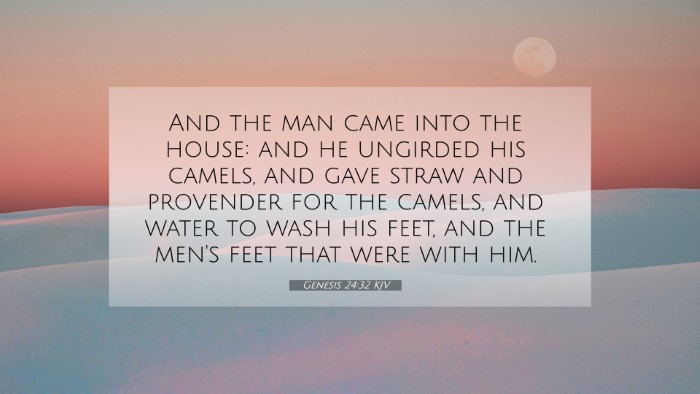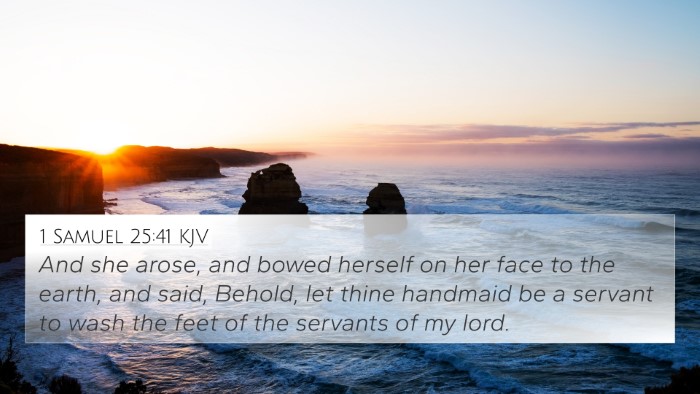Understanding Genesis 24:32
Genesis 24:32 states: "And the man came into the house: and he ungirded his camels, and gave straw and provender for the camels, and water to wash his feet, and the men that were with him's feet." This narrative verse serves as a practical illustration of hospitality and preparation in biblical times.
Summary of Genesis 24:32
This portion of Scripture occurs within the context of Abraham's servant seeking a wife for Isaac, highlighting the importance of social customs and the duty of hospitality in ancient cultures. The actions of the servant demonstrate not only his commitment to his mission but also his understanding of cultural norms.
Insights from Public Domain Commentaries
-
Matthew Henry:
Henry emphasizes the significance of hospitality as a virtue. He illustrates that the servant's actions in caring for the camels and the men reflect a character of diligence and respect for his host. Such hospitality was not merely a social nicety; it was a vital component of the covenant community, demonstrating responsibility and friendship.
-
Albert Barnes:
Barnes notes that the servant's preparations indicate his thoroughness and readiness for the task ahead. He highlights how the act of washing feet was vital after travel and is emblematic of the servant’s role as not just a seeker but also as a caretaker, ensuring comfort for all involved.
-
Adam Clarke:
Clarke points out that the details, such as the ungirding of the camels, illustrate the servant's willingness to ensure both his animals and his companions were well taken care of. This reflects the overarching theme of God's provision that runs throughout the biblical narrative.
Thematic Analysis of Hospitality
The actions in this verse can be connected to multiple themes in Scripture relating to hospitality and service. In a broader theological context, hospitality reflects God’s nature and the expectation of His people to embody those characteristics in their interactions with others.
Cross-References to Genesis 24:32
- Exodus 23:24: Demonstrates God’s expectations for hospitality among His people.
- 1 Peter 4:9: Encouragement to practice hospitality without grumbling.
- Hebrews 13:2: Instructions to entertain strangers, as some have entertained angels unaware.
- Genesis 18:2: Abraham’s hospitality to the three visitors, a model of welcoming the stranger.
- Ruth 2:9: Boaz's directive to care for Ruth showcases the importance of providing for others.
- Luke 10:34: The Good Samaritan exemplifies the essence of neighborly care and hospitality.
- Matthew 25:35: The teaching of Jesus that when we care for the least of these, we serve Him directly.
Connections Between Bible Verses
Examining Genesis 24:32 within the larger framework of Scripture reveals numerous layers of meaning regarding hospitality:
- As the act of washing feet signifies humility and service, various passages illustrate the importance of serving others.
- The broader narrative of Genesis 24 underlines themes of faithfulness, obedience, and divine direction.
- Comparative studies of different biblical figures show a consistent pattern of hospitality and care that align with God's covenant with His people.
Inter-Biblical Dialogue
The inter-Biblical dialogue surrounding hospitality is rich with cross-references that reinforce moral and ethical duties found in various texts:
- Old Testament Practices: The Old Testament law contains numerous directives concerning the treatment of strangers and guests.
- Proverbs 19:17: Highlights the links between kindness to the poor and generosity towards God.
- James 2:15-16: Questions the efficacy of faith without works, paralleling the duty of hospitality.
Taking Action: Tools for Bible Cross-Referencing
A sound understanding of Genesis 24:32 encourages readers to utilize tools for Bible cross-referencing to enhance their study of Scripture:
- Bible Concordance: Use concordances to find related verses quickly.
- Bible Cross-Reference Guide: Various guides provide thematic connections to better understand Scripture.
- Cross-Reference Bible Study: Engage with structured Bible study methods that focus on relational verses.
Conclusion
In summary, Genesis 24:32 serves as a vital part of the biblical narrative, encapsulating the principles of hospitality aligned with God’s character. By examining this verse through the lens of public commentaries and cross-referencing with other scriptures, individuals can gain a deeper understanding of God's expectations and the significance of serving others as a reflection of faith.










